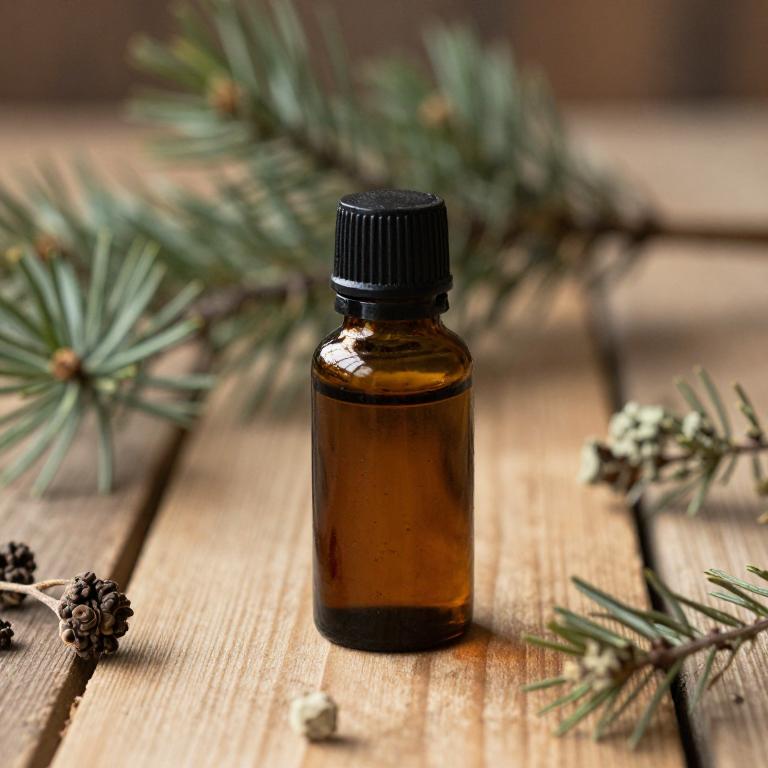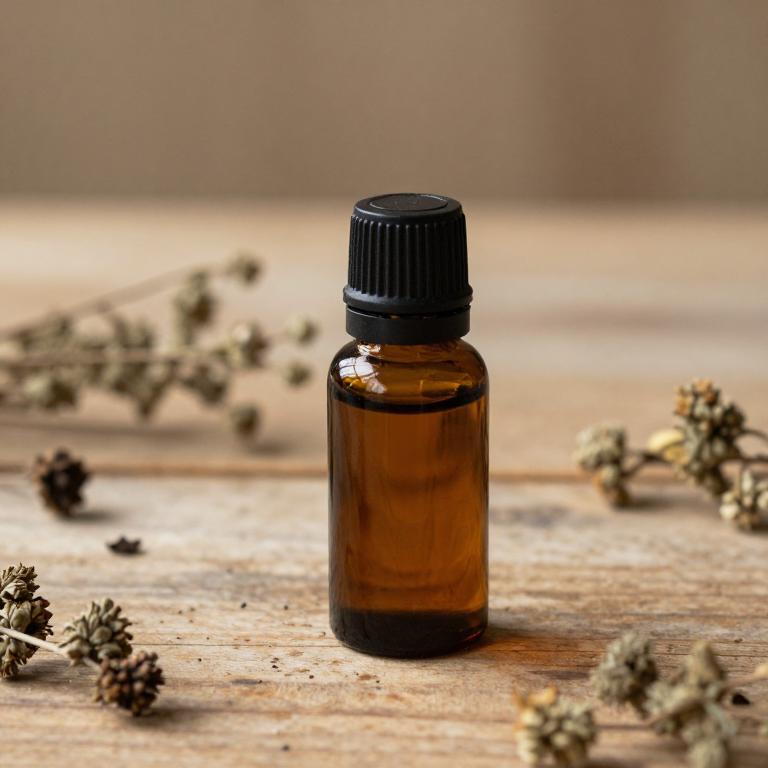10 Best Herbal Essential Oils For Runny Nose

Herbal essential oils such as eucalyptus, peppermint, and lavender are commonly used to alleviate symptoms of a runny nose by their decongestant and anti-inflammatory properties.
These oils work by stimulating the mucous membranes and promoting clearer breathing, often through inhalation or topical application. When diffused or added to a warm bath, they can help reduce nasal congestion and soothe irritated nasal passages. However, it is important to dilute essential oils properly before use to avoid skin irritation or allergic reactions.
Always consult with a healthcare professional before using essential oils, especially for children, pregnant women, or individuals with chronic health conditions.
Table of Contents
- 1. Eucalyptus (Eucalyptus globulus)
- 2. Rosemary (Rosmarinus officinalis)
- 3. Scots pine (Pinus sylvestris)
- 4. Ginger (Zingiber officinale)
- 5. Thyme (Thymus vulgaris)
- 6. English lavender (Lavandula angustifolia)
- 7. Ceylon cinnamon (Cinnamomum zeylanicum)
- 8. Peppermint (Mentha piperita)
- 9. Citrus sinensis
- 10. Melaleuca (Melaleuca alternifolia)
1. Eucalyptus (Eucalyptus globulus)

Eucalyptus globulus, commonly known as the Australian eucalyptus, is a popular source of herbal essential oils used for its respiratory benefits.
The essential oil contains compounds like 1,8-cineole, which have decongestant and anti-inflammatory properties. It is often used in aromatherapy to help alleviate symptoms of a runny nose by promoting nasal drainage and reducing mucus buildup. When diffused or applied topically (diluted), it can provide relief from nasal congestion and support overall respiratory health.
However, it is important to use the oil properly and consult a healthcare professional, especially for children or individuals with sensitive skin.
2. Rosemary (Rosmarinus officinalis)

Rosmarinus officinalis, commonly known as rosemary, produces an essential oil that is often used to alleviate symptoms of a runny nose due to its antiseptic and decongestant properties.
The oil contains compounds like cineole and camphor, which can help reduce nasal congestion and soothe irritated nasal passages. When diffused or applied topically, rosemary essential oil may help improve breathing and reduce the frequency of nasal drips. It is important to dilute the oil with a carrier oil before applying it to the skin to avoid irritation.
While rosemary essential oil can be a useful complementary treatment, it should not replace medical advice for persistent or severe nasal issues.
3. Scots pine (Pinus sylvestris)

Pinus sylvestris, commonly known as the Scots pine, produces an essential oil that is widely used in aromatherapy for its potential benefits in alleviating symptoms of a runny nose.
The oil contains compounds such as alpha-pinene and beta-pinene, which have anti-inflammatory and decongestant properties that may help reduce nasal congestion and mucus production. When inhaled, the aroma of Scots pine essential oil can stimulate the nasal passages and promote clearer breathing, offering natural relief for those suffering from colds or allergies. It is often used in diffusers or steam inhalation methods to support respiratory health.
However, it is important to dilute the oil properly and consult with a healthcare professional before use, especially for individuals with sensitive skin or respiratory conditions.
4. Ginger (Zingiber officinale)

Zingiber officinale, commonly known as ginger, is a popular herbal plant whose essential oil is widely used for its therapeutic properties.
The essential oil of ginger is known to possess anti-inflammatory and decongestant qualities, making it beneficial for alleviating symptoms of a runny nose. When inhaled, the aromatic compounds in ginger essential oil can help reduce nasal congestion and soothe irritated nasal passages. It is often used in diffusers or steam inhalation methods to provide relief from cold-related nasal discharge.
However, it is important to dilute the essential oil properly before use, as it can be potent and may cause irritation if applied undiluted.
5. Thyme (Thymus vulgaris)

Thymus vulgaris, commonly known as thyme, is a popular herb used in aromatherapy for its potent essential oils that can help alleviate symptoms of a runny nose.
The essential oil of thyme contains compounds like thymol and carvacrol, which have strong antiseptic and anti-inflammatory properties. When used in diffusers or inhalation therapy, thyme essential oil can help reduce nasal congestion and ease breathing by clearing the airways. It is often recommended for individuals suffering from colds or sinus infections due to its decongestant effects.
However, it should be used with caution and diluted properly to avoid skin irritation or allergic reactions.
6. English lavender (Lavandula angustifolia)

Lavandula angustifolia, commonly known as English lavender, is widely used in aromatherapy for its calming and soothing properties.
Its essential oil contains compounds like linalool and linalyl acetate, which have been shown to possess anti-inflammatory and antimicrobial effects. When used in a diffuser or applied topically (diluted), lavender essential oil can help reduce nasal congestion and alleviate symptoms of a runny nose. It is often recommended for its ability to ease respiratory discomfort and promote relaxation.
However, it is important to use the oil properly and consult with a healthcare professional, especially for those with sensitive skin or existing medical conditions.
7. Ceylon cinnamon (Cinnamomum zeylanicum)

Cinnamomum zeylanicum, commonly known as cinnamon bark, produces a warm, spicy essential oil that has been traditionally used to support respiratory health.
This essential oil contains compounds like cinnamaldehyde and eugenol, which possess antimicrobial and anti-inflammatory properties. When used in a diffuser or as a topical application, cinnamon essential oil may help alleviate symptoms of a runny nose by reducing nasal congestion and supporting immune function. Its aromatic properties can also help clear the airways and promote a sense of calm during respiratory discomfort.
However, it should be used with caution, as it may cause skin irritation if not properly diluted.
8. Peppermint (Mentha piperita)

Mentha piperita, commonly known as peppermint, is a versatile herb whose essential oil is widely used for its cooling and decongestant properties.
The essential oil of peppermint contains menthol, which acts as a natural decongestant by stimulating the trigeminal nerve and promoting nasal airflow. It can help alleviate symptoms of a runny nose by reducing nasal congestion and soothing irritated nasal passages. Peppermint essential oil is often used in inhalation therapies or diluted in a carrier oil for topical application.
However, it should be used with caution, as it may cause skin irritation or interact with certain medications when not properly diluted.
9. Citrus sinensis

Citrus sinensis, commonly known as the sweet orange, is a botanical source of essential oils that may offer relief for a runny nose due to its antimicrobial and decongestant properties.
The essential oil derived from the peel of the fruit contains compounds like limonene and linalool, which have been shown to reduce nasal congestion and inflammation. When diffused or applied topically, these oils can help open up the airways and alleviate sinus pressure associated with a runny nose. However, it is important to dilute the essential oil properly before use to avoid skin irritation.
As a natural remedy, citrus sinensis essential oil can be a valuable addition to a holistic approach for managing nasal symptoms.
10. Melaleuca (Melaleuca alternifolia)

Melaleuca alternifolia, commonly known as tea tree oil, is a popular essential oil derived from the leaves of the Melaleuca alternifolia plant, native to Australia.
While it is well-known for its antimicrobial properties, it is also sometimes used in aromatherapy to help alleviate symptoms of a runny nose, particularly in cases of colds or allergies. The oil is believed to have anti-inflammatory and decongestant effects that may help reduce nasal congestion and thin mucus. However, it is important to note that tea tree oil should never be applied directly to the skin or inhaled undiluted, as it can be irritating.
Instead, it is typically diluted with a carrier oil or used in a diffuser to safely support respiratory comfort.